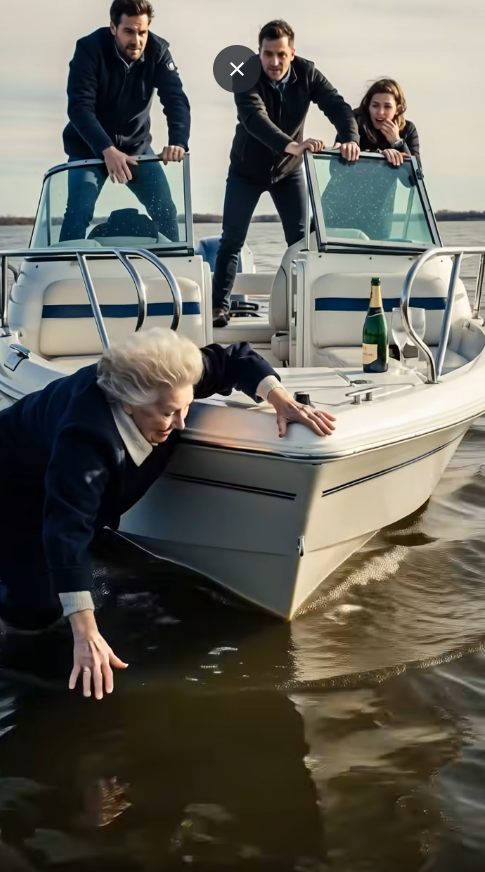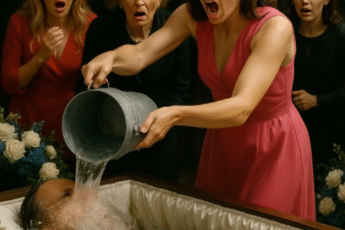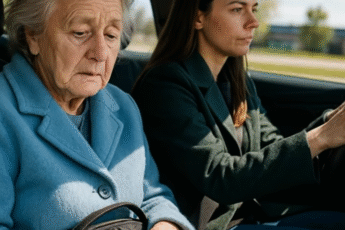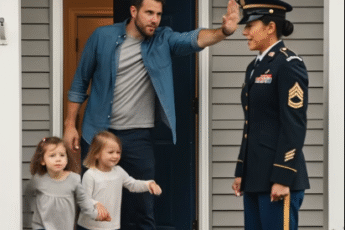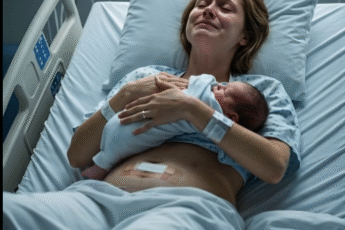They say the river can be bone-chillingly cold, but no cold compares to the emptiness in the eyes of a child you carried. That kind of cold doesn’t just seep into your bones; it freezes your heart solid. I learned that on the day my own flesh and blood conspired to end my life, pushing me into the indifferent water.
This is a true story—not about the battle against the current, but about surviving a truth more chilling than the coldest river.
It’s funny how a single face can reel in the years like a fishing line. Seeing Daniel stumble away in fear today doesn’t just remind me of the attack. It reminds me of everything that led to it and everything that came after. It reminds me of a life shaped by this river, a life that began long before he ever entered it. It began in a small shack in Topock with a father who understood the water’s soul. My whole life, I’d been a daughter of the river. It was my father who taught me to respect it, but never to be afraid of it. I never imagined that the real danger wasn’t the water, but the people you share a boat with.
My name is Eleanor Marie Waters, but everyone around here knows me as Ellie. I’ve got eighty-three years on my back, every one of them marked with sun and sand, just as it should be for someone born the daughter of a river guide in Topock, right there at the end of the canyon. Today, I live in this simple cabin here in Lake Havasu City, facing the Colorado River that tried to take me once but ended up returning me stronger.
The neighbors call me “the old lady who beat the river,” and I let them, because I did. Swimming for miles with these legs and arms that can barely handle the steps from the beach now, but that on that day, found a strength I didn’t even know I had. My father had a waterproof watch he’d bought from a foreign sailor, the kind that could handle even a deep dive. The day they shoved me off the boat, the first thing I did when I hit the water was look at it. Is it working? I thought. Then I’m going to work, too. I wasn’t going to let the last piece of my father sink with me.
My father taught me to respect the river, but never to fear it. And in that moment, I understood that letting fear—or the cruelty of others—pull you under, well, that’s the only real failure. The watch was still running, and so was I.
A Daughter of the River
Topock, where I was born in 1942, is one of those places where time seems to slow down. A small town on the canyon rim, a land of river guides who wake up before the sun and only return when their boat is full or the sky threatens to turn. It was there, in a wooden shack so close to the water that we had to put furniture on bricks when the river rose, that my father, Joe “The Guide,” taught me everything. My mother, Linda, I never knew. She died giving birth to me, leaving my father with only a photo of a beautiful young woman with straight black hair and a story that she held me once and whispered my name: Eleanor, so you’ll never forget you came from the river.
Without a mother, I was raised by the whole community. The other women would watch me while my father was out, but as soon as I was big enough, I went with him. I was the only girl among all those men, but on the river, what matters is if you know what you’re doing, not what you’ve got between your legs. I learned to swim before I could properly walk. By five, I was diving for shells. By seven, I was helping pull the lighter nets. The other children played with dolls; I played at being a guide.
Everything changed when I was twelve. I remember the sky dawned a strange, greenish color. My father sniffed the air and said, “Ellie, we’re not going out today. The weather’s no good.”
But then Gary, a newer guide, came along, insisting he’d seen an enormous school of bass. He pushed and pushed until my father gave in. “All right, let’s go,” he finally said, turning to me with a look I’d never seen before. “But the girl stays.”
“But Dad, I always help you!” I protested.
“The river’s not good today, Ellie,” he said, his voice harsh. “And you are going to obey me.”
That scared me more than any storm. I sulked at our neighbor Patricia’s house, watching their boat shrink on the horizon. The weather turned suddenly. The sky darkened, the wind howled, and the waves grew into mountains of water. Their boat, too small for that wild river, capsized. When the other guides arrived, they found only floating pieces of wood. Of Gary, there was no sign. Of my father, only his waterproof watch, stuck to a piece of debris.
I was an orphan at twelve, with only the river as my family.
The First Female Guide
The community wanted to send me to an aunt in Phoenix or an orphanage, but Patricia put her foot down. “The girl is staying with me,” she announced, and that was that. For the first few days, I couldn’t even look at the river. I was angry at it. But soon, I understood it wasn’t the river’s fault. It had been the storm, and maybe Gary’s stubbornness.
I started to study the river more deeply—the currents, the tides, the signs of a storm. Everything my father had taught me, and more. By fifteen, I knew as much as any adult guide. When I turned eighteen, I made my announcement.
“I’m going to be a guide.”
People laughed. “Women aren’t guides,” they said. “The river is a man’s place.”
Not even Patricia supported me. “Girl, this is no life for a young lady. What man would want a woman who smells like fish?”
But I had inherited my father’s stubbornness and the can of money he’d saved. I bought an old boat, fixed it up, and bought used nets. The first day I went out alone, the whole town watched from the shore, placing bets on how long it would take for me to come back crying. I left in the dark and returned at night, my boat so full of fish I could barely row. I stopped in front of everyone, unloaded my catch, and said nothing. The pile of bass and trout spoke for me.
From that day on, no one doubted me. The years went by, and I became the best. I had a sixth sense for the water. Other guides started asking me for advice. I was the first female guide in Topock, but not the last. I taught any young woman who came to me, and soon, our town had a small fleet of them.
By thirty, Topock felt too small. I heard about a guide in Lake Havasu City selling his spot. I didn’t think twice. I bought his small cabin with a breathtaking view of the Parker Strip. The guiding here was different—choppier currents, stronger fish—but I adapted. I started selling my catch directly to tourists on the beach, cleaned right there on the spot. Soon, a line would form on weekends.
It was there I met Walter. He owned a general store and respected me as a guide. He never tried to pull me away from the river. We married six months later. At thirty-seven, to my surprise, I got pregnant. The doctor called it a high-risk pregnancy and ordered me to rest. Those were the most difficult nine months of my life, stuck at home, watching the water from my window.
Charlotte was born on a stormy afternoon. When they placed that crying bundle in my arms, I knew it had been worth it. She was a beautiful girl with her father’s eyes and my stubborn chin. But she never had much interest in the river, preferring the general store with her father.
Life was quiet until Walter got sick. Lung cancer. In six months, he was gone. I was fifty, and Charlotte was thirteen. Suddenly, everything was on my shoulders. I worked more, slept less, and raised my daughter. She was a good girl and went off to college to study business. I was proud. She was building a life I never had.
At sixty, my body started to complain. I sold the boat, hung up my boots, and retired. It was around then that Charlotte, now thirty-five, met Daniel. He was a real estate agent from the city—handsome, talkative, with an artificial way about him, as if he was always selling something.
“Mom, are you jealous?” she’d asked when I tried to warn her. “Daniel loves me. He only wants the best for us.”
Oh, if only I had known what “best” meant.
After they married, their visits to my cabin changed. Daniel would look at the land, measuring it with his eyes. The hints started subtly.
“Eleanor, don’t you think this cabin is too big for you?”
“Eleanor, climbing this hill every day must be hard at your age.”
I always gave him the same answer. “Daniel, I’m fine here. I’m only leaving when I go to the cemetery.”
The last straw was when he showed up with a brochure for a nursing home. “It’s a residential community,” he corrected. “It has a nurse 24 hours a day, balanced meals…”
“Listen here, son,” I finally snapped. “I spent my life facing a river that’s a lot more dangerous than any hill. I’m not going to stick myself in a place full of old people to wait for death.”
I saw something in his eyes then—a cold, calculating determination. The worst part was seeing Charlotte begin to side with him. My girl was changing. One day, sitting on my porch, I understood. They didn’t want me to move for my own good. They wanted the land. My cabin, with its river view, was worth a fortune. My own daughter saw me not as a mother, but as an obstacle.
The Best Ride of My Life
The calls became rarer, until one day, on the eve of my seventy-fourth birthday, Charlotte called with a surprise. “Mom, Daniel rented a boat! We’re going for a ride on the river, just like you love.”
For a moment, hope flickered. Had I been wrong? I accepted, excited to be back on the water.
That morning, the river was as calm as a mirror. Charlotte picked me up, nervous and talking too much. Daniel was waiting at the pier, dressed in white, all smiles. “Happy birthday, Eleanor!” he exclaimed. “Ready for the best ride of your life?”
The boat was a nice day cruiser. As we set off, I noticed strange details. No life jackets in sight. A bottle of champagne with only two glasses. But I pushed my suspicions aside. Why ruin my own birthday?
After an hour, Daniel steered us into a deserted area, far from shore. “We’re here,” he announced, turning off the engine. All around us was just open water. “Let’s toast your birthday,” he said, pouring champagne into two glasses for them and a plastic cup for me.
“Why the plastic cup?” I asked.
“Oh, I broke a glass by accident,” he answered too quickly. “To your health, Eleanor. May you have many more years ahead.”
I pretended to drink, but the liquid I tasted was bitter. They watched me, waiting. It was then I saw the look between them—quick, secret, and final. My stomach sank.
“You know, Eleanor,” Daniel began, approaching me casually, “I’ve been thinking about the cabin…” He paused, then pointed. “Look, I think I saw a heron over there.”
Automatically, I turned. Before I could say I saw nothing, I felt his hands on my back. A strong, decisive shove.
One second I was on the boat, the next I was falling. The cold water shocked the air from my lungs. When my head broke the surface, I heard the engine start. Daniel was accelerating away. Charlotte was at the stern, looking back. Our eyes met. There was no triumph in her gaze, just a kind of sad resignation. Then she turned away.
I was alone, floating, the pain of betrayal colder than the water itself. A part of me wanted to give up, to let the river take me as it had my father. But then I felt the watch on my wrist. I looked at it. 11:23 AM. It was still working.
I won’t give you that satisfaction, I thought. The decision was made. I would fight.
Eight Hours
I assessed my situation. The shore was a thin line on the horizon, maybe four miles away. The tide was going out, working against me. But years of knowledge flooded back—a survival strategy. I would swim not directly to shore, but at an angle, using the currents and waves. My father would be proud.
“All right, old river,” I murmured. “It’s just the two of us again. Let’s see who wins.”
I started swimming, alternating strokes to conserve energy. The first mile was almost easy. By the third, my body screamed in protest. Each stroke was a conscious effort. I talked to myself, remembering storms I’d faced, pushing away the despair. The sun began to set. I’d been in the water for hours. I finally spotted a navigation buoy and, with my last ounce of strength, hoisted myself onto its small platform to rest. The shore was closer now, maybe a mile. I slid back into the water.
The final stretch was a trance. My body moved on pure stubbornness. I could feel the sand beneath me but didn’t have the strength to stand. I dragged myself until my hands touched the rocks of the pier. I grabbed a metal ladder and climbed, step by agonizing step, until I rolled onto the solid concrete.
I lay there, my body throbbing. Alive. My watch read 7:17 PM. Almost eight hours in the water.
It was then that I saw their boat entering the harbor. They were creating their story—the tragic accident, the fruitless search. I watched them dock. Daniel saw me first. The color drained from his face. Charlotte followed his gaze, and a gasp escaped her lips. She stumbled, leaning on the boat to keep from falling.
I didn’t scream. I didn’t call the police. I just sat there, soaked but alive, and looked at them. My silence, my survival—that was the verdict. The terror in their eyes was all the confirmation I needed. After a moment that felt like an eternity, I stood up, turned my back, and began to walk away. The river had returned me to the shore, and I wasn’t about to waste that gift looking backward.
The River Gives Back
I didn’t go back to my cabin that night. The next morning, I went to see Justin, an old friend who had become a lawyer.
“Ellie, you have to report them,” he urged after hearing my story. “That’s attempted murder.”
“No,” I said. “I don’t want to involve the police. But I want to change my will. Today.”
He understood immediately. The reason for all of this was the cabin. That same afternoon, I signed a new will. My cabin, my land, everything would go to the Lake Havasu City River Guides Cooperative. My legacy would be about knowledge, not greed.
A few days later, they appeared at my door.
“Mom, thank God you’re okay,” Charlotte began, trying to hug me.
I moved away. “You don’t have to pretend, Charlotte. The three of us know what happened.”
“It was a terrible accident, Eleanor,” Daniel interjected. “You slipped.”
“The river was as calm as a lake, Daniel,” I cut in, my voice steady. “I swam for eight hours. I had plenty of time to remember your hands on my back.”
The silence was heavy. Charlotte started crying—tears of fear, not repentance.
“What are you going to do?” Daniel finally asked.
“I’m not going to the police,” I said, and I saw the relief on their faces. “But I want you to know two things. First, you will never have this cabin. I’ve changed my will. Second, you wanted me gone. In a way, you got your wish. The mother you knew is gone. You are never welcome in my home again. Get out.”
“You’re going to regret this, Eleanor!” Daniel thundered as he dragged Charlotte out. “We’ll contest that will!”
“You can try,” I answered calmly. “Justin, the lawyer who drafted it, would love to meet you in court.”
That was the last I saw of him for a long, long time.
The River Grandma
The story spread, as stories do in a small town. Most people were on my side. I started to build a new life from the wreckage. One afternoon, I saw children playing on the beach, many of whom could barely swim. I remembered how my father had taught me, how that knowledge had saved my life.
I offered to teach them, for free. We started with a small group, and soon it grew. I didn’t just teach swimming; I taught them about the river, about the currents, the winds, the stories. The River Guides Cooperative heard about my work and invited me to be an instructor for their new “river school.”
At seventy-five, I had a new purpose. The project grew beyond my wildest dreams. Newspapers and television crews came. They called me the “River Guardian.” My pain had been transformed into something that saved lives. The cabin, once a source of conflict, became a community space where I told stories and shared my knowledge.
Years passed. One day, a letter arrived. It was from Charlotte. She and Daniel had separated. She wrote of her regret, her shame. She didn’t ask for forgiveness. I didn’t respond.
And so, my life found a new current. The cabin became a community hub. The children I taught grew up, some becoming guides themselves, others taking the knowledge into careers in science and conservation. They were my legacy. They called me the “River Grandma.”
Then, a few years later, I received an unexpected visit. An elderly woman, hunched and walking with a cane, approached my porch. It was Charlotte. She had aged far beyond her years.
“Mom,” she said, her voice trembling. “I came to ask for forgiveness. I know I don’t deserve it.”
She told me how Daniel had manipulated her, how she was too afraid to say no. They weren’t excuses, just explanations.
“Charlotte, I don’t know if we can go back to being what we were,” I answered honestly. “A river never flows backward. After a flood, it carves a new path. Forgiveness is like that. It’s not about erasing the scar, but allowing a new current to start flowing.”
It wasn’t a complete forgiveness, but it was a door left ajar. She started visiting weekly. She never asked to be part of my project, but she started showing up, helping in small, silent ways—patching a scraped knee, mending a net. Her penance was paid in acts of service. She wasn’t reclaiming her place as my daughter; she was earning her place in the community I had built.
Today, at eighty-three, seeing Daniel flee in fear felt like a full circle. He was still the same cowardly man. But I had changed. I had transformed tragedy into triumph, betrayal into a legacy.
The sun is setting now, painting the river in shades of orange and pink. The children are playing on the beach. My daughter is quietly tidying up the porch. I look at the watch on my wrist, still ticking, still marking the time.
The river takes, my father used to say, but the river also gives. You just have to know how to wait, how to receive. It tried to take me twice, but both times it returned me stronger, wiser, and more determined to live the time I had left to the fullest.
